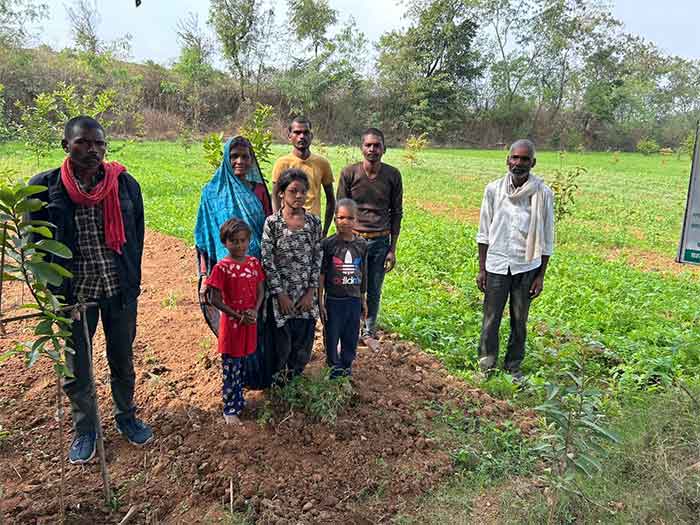
Sona is sitting with some of her family members near her farm. The lush greenery of crops, fruit trees and vegetable plants serves as a symbol of the improving prospects of this Saharia tribal family based in Bamhori village of Talbehat block, Lalitpur district (Uttar Pradesh).
However her face grows grim as she recalls the condition till just a decade back—For the most part we were not able to cultivate our fields, or else the yields of on farmland was so low as to make the entire effort non-viable. Hence the family had become dependent on migrant labor work for sheer survival. My husband went to Indore or other places, generally to work in brick kilns. Sometimes I too went. We had to work and live there in very difficult conditions.
Her husband adds—there were certain phases when we got caught in very exploitative conditions and despite toiling very hard we could hardly send anything back home.
Sona continues—A lot of the problems arose due to lack of water. So when we learnt that efforts were being made to conserve water we decided to come back and see if something can still be done in our village. After all we have land here, and the desire to go back to our farm-based livelihood was always there.
When they came back to their village, they found some young men and women from an organization called Parmarth visiting their village repeatedly, holding meetings to discuss the possibilities of improving water conservation.
“This is exactly what I had yearned for, so I quickly became involved with their efforts”, Sona recalls.
The Parmarth visitors too were on the lookout for village based volunteers who can help with community mobilization. The most promising women volunteers were being selected as jal sahelis (water friends) and taken for training workshops and exposure visits to see good examples of water conservation work. Sona liked it all, all the more so when she was selected as a jal saheli. In addition a wider community-based organization on water-related issues called paani panchayat was also formed.
Now Sona started mobilizing women for water conservation work, whether taken up under NREGA (rural employment program) or in other ways. As most such work involves work under NREGA, these women were involved in trying to improve the functioning of NREGA work too. Things began to look up once people were involved in the functioning of the program and in issues like site selection. The most promising water conservation work here was taken up on Naraini nullah where a check dam was constructed using NREGA budget. As a result neglected, deserted fields started blooming with green crops. While about 50 acre of land benefited directly from this irrigation, water level in wells rose over a much wider area, helping other farmers too.
With more water available now, Sona and her family also returned to farming with more hopes and enthusiasm, determined to be successful in earning a satisfactory livelihood within their village. Following their inter-actions with Parmarth, they decided to opt for low-cost natural farming. They started preparing organic manure on their farm. With Parmarth helping with seeds, they also opted for a diversity of crops, combining cereals, millets, a diversity of vegetables with some fruit trees like guava and lemon.
Sona says we are eating healthy and nutritious food now, and also producing some extra food to sell in the market.
Another interesting effort has been to try to revive traditional millet crops like sawan and kodon. One part of their farm is set aside for this. They also aim to save seeds and develop a seed bank of millets so that other farmers too can get seeds from them.
While their journey from exploited brick kiln workers to sustainable farming has been a source of satisfaction for Sona and her family members, they are only too aware that much more needs to be done. As Sona says, “So many of us are still in extreme difficulties, they still need to migrate. You only have to look at the settlement of Tendra just a few miles away. You will find most houses locked up there as most people have already left in search of employment to distant areas.
Clearly the task ahead is much bigger, the challenges are much wider. Nevertheless, it is good to know that some like Sona have found the means of coming back to the relative security of their well-cultivated farms instead of having to toil in conditions of great uncertainty as exploited migrant workers in distant areas.
Bharat Dogra is Honorary Convener, Campaign to Save Earth Now. His recent books include India’s Quest for Sustainable Farming and Healthy Food, Man over Machine and When the Two Streams Met.
















































